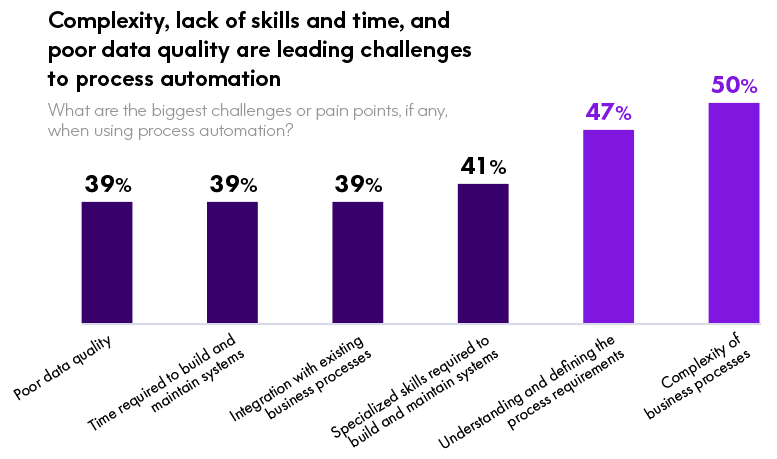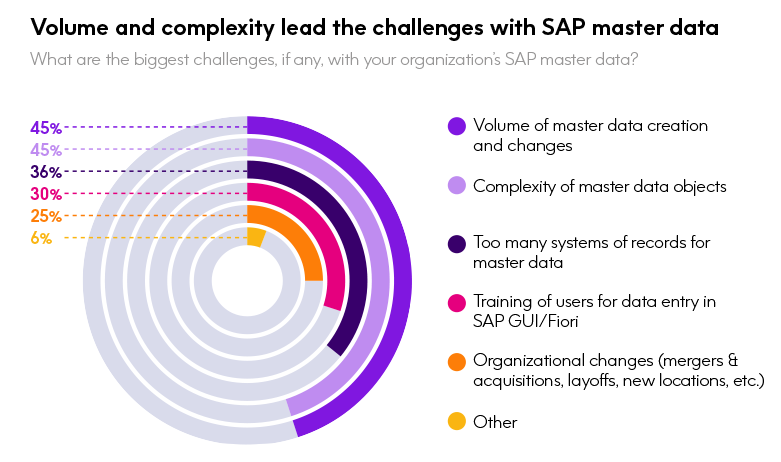Complexity is at the core of SAP automation challenges
The core challenges to automating SAP processes essentially boil down to complexity. The business processes themselves are complex, as are the data objects associated with each SAP record. Both present significant difficulties to those attempting to analyze and reengineer a specific process or activity. We have understood this for years, but the survey results quantify this tribal knowledge.
Let’s start with the complexity of the business processes. Respondents who reported using automation at levels of “medium” through “very high” were asked to identify all applicable challenges to process automation. “Complexity of business processes” was cited by 50% of the respondents, ranking it as the top challenge to SAP process automation.
Interestingly, 64% of companies where enterprise architecture teams are leading automation efforts cited process complexity as a challenge, versus only 29% of respondents where automation efforts are led by dedicated digital transformation or center of excellence teams. This may indicate that implementing process automation is better led by teams closer to SAP ERP and the business processes themselves rather than by teams focused on the underlying infrastructure and the chosen automation technology.
A close second in our survey was the challenge of understanding and defining the requirements for automating a specific process, which was cited by 47% of respondents. Complex, data intensive SAP processes that involve constituents across an organization are often difficult to analyze fully since they frequently have multiple contingencies depending on specific parameters. Replicating the business rules necessary to guide and orchestrate the automation of these processes can be a daunting, time-consuming exercise.
Read our Report
The 2023 State of SAP Automation Report
Working with the Americas SAP Users Group (ASUG), Precisely conducted a research study to identify the importance, challenges and opportunities that automating complex, data intensive SAP processes presents for enterprises.
Addressing poor data quality
Following the top two are challenges associated with identifying and maintaining automation tools and solutions, difficulties with resources and personnel, and issues concerning integrating other systems into SAP processes. Poor data quality is also called out as a specific challenge. Through our work with customers, we usually see data quality challenges associated with automation and falls into two categories:
- Reengineering the processes that are generating bad data to make them more efficient and eliminate data quality issues
- Analyzing processes for automation based on poor quality data
The former can often be addressed through improved process governance stemming from a well-designed and implemented automation solution. The latter can be addressed by implementing a longer-term, real-time process analysis that does not rely on historical data. This approach can identify inconsistencies and problems as they happen, discarding those incidents from the analysis. This “clean” analysis can then be used to reengineer the process for automation.

Challenges specific to SAP master data processes
Drilling down into SAP master data processes gives us a more granular sense of the challenges companies face around core data creation and management. SAP master data processes are generally high volume, complex processes that involve multiple constituents and large numbers of data objects in a master data record.
The volume of activity and the complexity of the data objects were cited by 45% of respondents as the biggest challenges they face in creating and managing SAP master data. Different types of automation solutions generally address each challenge. High volume processes can best be streamlined by adopting a data automation solution. In contrast, complex objects and processes that involve data additions or reviews across different departments are best automated through workflow solutions that rely on forms for data collection and management.

Complexity of master data objects aligns with the complexity of managing, changing, or automating SAP master data processes. Managing master data across multiple systems of record usually means the automated solution will include a multi-domain system and possibly require coordinating with other, enterprise wide systems such as Salesforce. Thirty percent of respondents also agreed that training staff on SAP master data processes is a challenge along with the difficulty in reengineering these complex processes for automation.
Analyzing both the broader business challenges and the more granular challenges associated with master data helps us better understand why only 5% of companies have achieved a high level of automation in their organization.
Our experience at Precisely helping companies automate SAP processes shows these challenges can be overcome. In most cases, it takes a dedicated effort to analyze the processes currently in place for creating and managing SAP data. With this in place, it can be relatively easy to parse the processes into related components that can be the starting point for automation.
For more on the latest automation trends and insights, and what they mean for your business, read the 2023 State of Automation Report.







